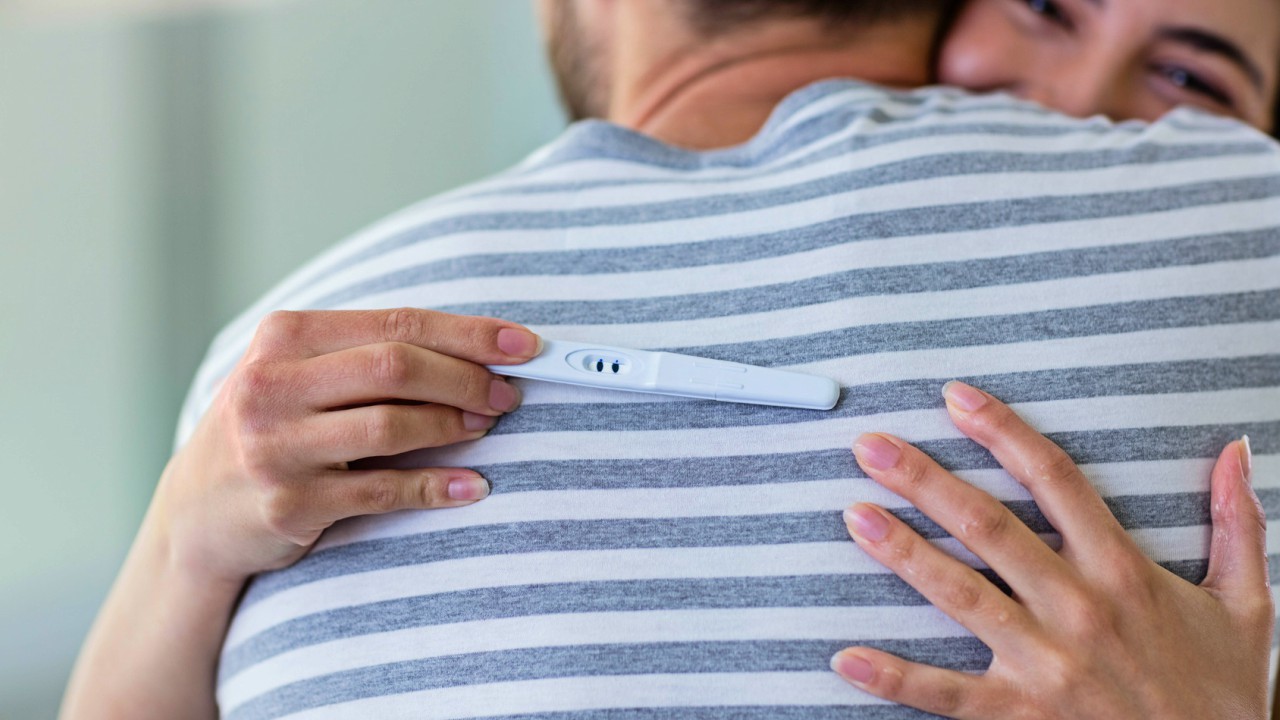 ShevarevAlex/fotolia
ShevarevAlex/fotolia
Sponsored by: The Stork® OTC
Are you hoping that this year will also bring you a new baby? If getting pregnant is one of your New Year’s Resolutions, here are some things you can do to optimize your chances of conceiving.
1) See Your Doctor.

Photographee.eu/fotolia
It’s a good idea for both you and your partner to get a complete physical. Your doctor can screen you for any undetected conditions that might make it difficult to conceive such as diabetes, obesity, and certain thyroid problems.
If you struggle with any of these issues, your physician can help you create a plan to get them under control. Your doctor can also help you identify any lifestyle factors, like smoking, that may be detrimental to you and your future baby.
2) Clean Up Your Diet.

Via Unsplash
One of the best ways to prepare your body for pregnancy is to make sure it’s getting all the nutrients it needs. The American Pregnancy Association recommends a diet with a variety of fruits, vegetables, whole grains, lean meats and dairy.
Fill in any nutritional gaps with a prenatal vitamin that contains folic acid. You might also want to reduce your caffeine intake since high levels of caffeine can lower your body’s ability to absorb certain nutrients you’ll need during pregnancy.
Finally, consider avoiding artificial sweeteners since research on their safety during pregnancy is inconclusive.
3) Understand Your Menstrual Cycle.

Via Pexels
Tracking when your period stops and starts can help you gain a better understanding of your fertility. Paying attention to when you ovulate, the consistency of your cervical mucus, and other subtle signs your body gives can help you pinpoint the best days to have sex. This may even help you become aware of potential fertility problems.
If you’re new to tracking your cycles, consider reading a book that will teach you how to do it. “Taking Charge of Your Fertility,” by Toni Weschler, is one of the more popular ones.
There are also dozens of apps available to help you keep track of your cycle on your smartphone too.
4) Reduce (or Eliminate) Alcohol.

Via Pexels
We’ve all heard stories of women who get pregnant after a night of drunken sex, but heavy drinking can actually decrease a woman’s fertility. Several recent studies have shown that as few as three to five drinks a week can lower your odds of getting pregnant.
The U.S. Surgeon General even recommends that women who are considering pregnancy should abstain from alcohol completely. Since most women don’t realize they’re pregnant until a few weeks after conception, stopping drinking when you stop birth control is a wise step.
Men who are trying to conceive should stick to only a few drinks spread out during the week, since heavy drinking can lower sperm quality. Your man’s swimmers take about three months to mature, so he should reduce his alcohol intake around 90 days before you stop birth control.
5) Keep Your Man Cool.

Via Pexels
Heat can also affect the quality of sperm. Ask your partner to steer clear of anything that will heat up his genitals. Hot tubs, saunas, frequent bike riding, and even tight clothing can warm up his testicles enough to lower his sperm count.
You may even want to ask him to avoid using his computer on his lap, since a recent study published in the journal Fertility and Sterility showed that the radiation from laptop Wi-Fi can emit enough heat to negatively affect sperm.
6) Enjoy the Process.

rocketclips/fotolia
Keep in mind that 80 percent of couples are pregnant within six months, but it can often take longer depending on your age or certain health conditions, according to BabyCenter.
If you’re under 35 and haven’t conceived after one year of well-timed, unprotected sex, see a fertility specialist. If you’re 35 or older, request an appointment after six months.
Baby-making can be fun if you don’t put too much pressure on yourself. Try to enjoy the extra time you’re spending in bed with your partner!
Timeline for conception:
6 Months to One Year Before Stopping Birth Control.
- Both partners should get a complete physical.
- Female partner should start tracking her cycles.
- Female partner should clean up her diet and add a prenatal vitamin for folic acid.
- Both partners should stop smoking.
3-6 Months Before Stopping Birth Control.
- Both partners should reduce alcohol intake.
- Male partner should avoid overheating the testicles.
When You Stop Birth Control.
- Stop drinking.
- Reduce your caffeine intake.
7) Try a Non-invasive Treatment Option Like The Stork® OTC

WavebreakMediaMicro/fotolia
If you’ve tried all of the steps above and still have not been able to get pregnant, remember there are treatment options available. And if you don’t want to try a more aggressive treatment quite yet, The Stork® OTC is one over-the-counter option you can use from the comfort of your own home.
The Stork® OTC uses cervical cap insemination to place sperm closer to the opening of the cervix, optimizing chances of pregnancy. Today the product is available at many online retailers as well as some store locations for Walgreens and CVS Pharmacy.
To learn more about how The Stork® OTC can help you in the New Year, visit: www.storkotc.com.
1) Preconception Nutrition For Increasing Your Fertility. American Pregnancy.org. Retrieved November 4, 2016.
http://americanpregnancy.org/getting-pregnant/preconception-nutrition
2) Artificial Sweeteners And Pregnancy. American Pregnancy.org. Retrieved November 4, 2016.
http://americanpregnancy.org/pregnancy-health/artificial-sweeteners-and-pregnancy
3) Jensen, Tina Kold et al. Does moderate alcohol consumption affect fertility? Follow up study among couples planning first pregnancy. BMJ. 1998 Aug 22; 317(7157): 505–510.
https://www.ncbi.nlm.nih.gov/pmc/articles/PMC28642
4) A 2005 Message to Women from the U.S. Surgeon General: Advisory on Alcohol Use in Pregnancy. CDC.gov. Retrieved November 4, 2016.
https://www.cdc.gov/ncbddd/fasd/documents/surgeongenbookmark.pdf
5) Just five alcoholic drinks a week could reduce sperm quality. The Guardian.com. Retrieved November 4, 2016.
https://www.theguardian.com/science/2014/oct/03/bmj-open-sperm-quality-alcohol-five-units-study-semen
6) Avendaño, Conrado M.S. et al. Use of laptop computers connected to internet through Wi-Fi decreases human sperm motility and increases sperm DNA fragmentation. Fertility and Sterility. January 2012 Volume 97, Issue 1, Pages 39–45.e2.
http://www.fertstert.org/article/S0015-0282%2811%2902678-1/abstract
7) New Model Predicts Women’s Odds Of Getting Pregnant. Huffington Post.com. Retrieved November 4, 2016.
http://www.huffingtonpost.com/2012/10/08/predict-odds-of-getting-pregnant_n_1948517.html




Add a CommentComments
There are no comments yet. Be the first one and get the conversation started!